Produced in conjunction with this week's offer to screen the new restoration of The Grey Fox at home, another new episode of our Cinematalk podcast is available. The show focuses on The Grey Fox through an interview with the film's producer Peter O'Brian, who remembers Phillip Borsos and the "Tax Shelter" era of Canadian Film Production. Later on in the podcast, a chat with Mary Sweeney, co-writer, producer and editor of The Straight Story, who shares her memories of Grey Fox and Straight Story leading man Richard Farnsworth. Listen here on Soundcloud or just scroll and click below to begin listening! Cinematalk is also available through ITunes podcasts.
Cinematalk Podcast #8: THE GREY FOX, w/Guests Peter O'Brian & Mary Sweeney
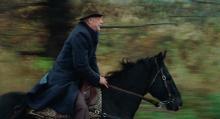
See New Restoration of THE GREY FOX at Home!
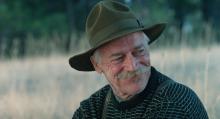
UPDATE (5/29/20, 3:15 p.m.) Due to overwhelming demand, we have distributed all of the free passes to view The Grey Fox. The new restoration from Kino Lorber is still available to view at home for a $10 rental fee. 50% of the rental proceeds go to support future Cinematheque programming. You can access the rental page here.
Once again this week, the UW Cinematheque brings you another slice of great cinema that you can watch at home for free. Our selection is The Grey Fox, a Western adventure and love story originally released to American cinemas and widespread critical and audience acclaim in 1983.
THE GREY FOX (Canada, 1982, 91 min.). One of the best remembered of all contemporary Canadian features, The Grey Fox tells the lyrical and legendary saga of real-life outlaw Bill Miner (Richard Farnsworth) in the early years of the 20th century. Miner finds it difficult to fit into polite American society after spending more than 30 years in prison for stagecoach robbing. Inspired by a classic silent movie, "The Gentleman Bandit" relocates to British Columbia where he finds romance with an outspoken and independent artist (played by Jackie Burroughs) and a new career as the leader of a train robbing gang.
The Grey Fox marked the feature debut of Oscar-nominated director Phillip Borsos, whose films have been noted for their gentle rhythms and pictorial beauty. Only 27-years-old during the production of the The Grey Fox, Borsos and his movie brought widespread recognition to former stuntman and Western bit-player Richard Farnsworth, who was 60 during production. The successful original release of The Grey Fox launched two busy decades of character actor work for Farnsworth, culminating in his Oscar-nominated leading role in David Lynch’s The Straight Story in 1999.
The Cinematheque is offering a limited number of opportunities to watch a brand new restoration of The Grey Fox at home. To receive your free online access, send an email to info@cinema.wisc.edu, and don't forget to put the words GREY FOX in the subject line or in the first line of the email.
Plus, another new episode of our Cinematalk podcast is available. The show focuses on The Grey Fox through an interview with the film's producer Peter O'Brian, who remembers Phillip Borsos and the "Tax Shelter" era of Canadian Film Production. Later on in the podcast, a chat with Mary Sweeney, co-writer, producer and editor of The Straight Story, who shares her memories of Richard Farnsworth. Listen here on Soundcloud or just scroll and click below to begin listening!
Discover J. Lee Thompson's ICE COLD IN ALEX for Free!

While the UW Cinematheque's screenings at 4070 Vilas and the Chazen Museum of Art remain on indefinite hiatus during this challenging time, we are thrilled to be bringing you another terrific feature film to watch at home and for free, the exciting 1957 British action drama Ice Cold in Alex.
ICE COLD IN ALEX (UK, 1957, 130 min.) North Africa, 1942. Fleeing encroaching German forces, a five-person British ambulance crew take on a perilous journey to Alexandria after being separated from their unit. Led by a traumatized but disciplined and determined Captain (played by British screen great John Mills), the tiny band of heroes must contend with scorching desert heat, land mines, quicksand, and other more insidious obstacles on the road to safety. This suspenseful and beautifully acted adaptation of Christopher Landon’s novel is one of the finest of all war films (and road movies). Ice Cold in Alex marked a turning point in the career of veteran British director J. Lee Thompson (The Guns of Navarone, Cape Fear), who, along with the cast, brought impeccable, showstopping craftsmanship to this tale of ordinary individuals faced with extraordinary challenges. The arrestingly beautiful black-and-white cinematography is by frequent Thompson collaborator Gilbert Taylor (Star Wars, A Hard Day’s Night). The American release of this beloved-in-Britain classic was generically re-titled Desert Attack and had nearly an hour removed from the original running time. The Cinematheque is pleased to offer a recent restoration of the uncut version of Ice Cold in Alex, the perfect way to discover this unsung masterpiece.
We have a limited number of screening codes (100) that will allow you to watch Ice Cold in Alex at home through May 28. To receive a link to view, send an email to info@cinema.wisc.edu, and please write the words ICE COLD in the subject line or the first line of your email.
Also, listen below to this week's Cinematalk podcast. On the first segment of the podcast, Cinematheque programmers Jim Healy and Ben Reiser discuss Ice Cold in Alex and assess the fascinating career of director Thompson. In the second segment, we are joined by our special guest, UW Madison alum and esteemed editor Mark Goldblatt (The Terminator, Rise of the Planet of the Apes), Goldblatt offers his own praise of Ice Cold in Alex and reflects on his time as the editor of J. Lee Thompson’s 1984 movie The Ambassador, which screened at the Cinematheque in 2017.
Discover FOURTEEN and 3 More Dan Sallitt Movies for Free!
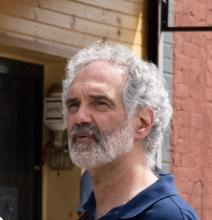
UPDATE (5/20/20, 3:15 p.m.) We have distributed all of the allotted free screenings of Fourteen, per our agreement with Grasshopper Film. Fourteen is still available for viewing for a $12 rental price here. 50% of the proceeds from these rentals will directly benefit the UW Cinematheque.
While the UW Cinematheque's screenings at 4070 Vilas and the Chazen Museum of Art remain on indefinite hiatus during this challenging time, our programming staff is delighted to present a retrospective of independent filmmaker Dan Sallitt that can be viewed at home this week for FREE!
On Friday, May more than 50 arthouses around the U.S. will be partnering with Grasshopper Film to provide home screenings of Sallitt's new movie Fourteen for a rental fee, but the Cinematheque has arranged to offer a limited number of free home viewings of Fourteen. To receive your online link to view the movie at home, simply send an email to info@cinema.wisc.edu with "Fourteen" or "14" in the subject line. These virtual screenings of Fourteen will be limited to the first 150 individual responders, who will be provided a link to view online beginning May 15.
FOURTEEN: Independent filmmaker Sallitt's fifth feature is an absorbing and deeply moving portrait of long-term friendship. Inseparable since middle school, Mara and Jo find themselves drifting down different paths in their twenties-Mara naturally eases into young adulthood, while Jo struggles with commitments and substance abuse. Through seamless temporal ellipses, Sallitt charts their lasting bond over the course of a decade of change.
Fourteen has garnered rave reviews around the world since its premiere at the Berlin Film Festival in 2019. Publications that have hailed Sallitt's film include Film Comment, Sight and Sound, Indiewire, The Hollywood Reporter, and Richard Brody in The New Yorker.
Click here to view a trailer for Fourteen or scroll down to view at bottom of this page.
Plus, the Cinematheque is providing you the opportunity to discover the early features of Dan Sallitt with free viewings of his first three features: Polly Perverse Strikes Again!, Honeymoon, and All the Ships at Sea. Unlimited views of these three movies will be available for one week's time beginning Friday, May 15. You can view by clicking on any of the titles in this paragraph.
POLLY PERVERSE STRIKES AGAIN!: This LA love triangle comedy has been described by the filmmaker as a cross between Bringing Up Baby and The Mother and the Whore. Produced for far-out video art pioneers EZTV, Sallitt's rarest feature was shot on three-quarter inch analog video using money he saved from reviewing films for the Los Angeles Reader. "Quintessentially Sallitt-men and women scrambling, sometimes successfully, often not, to impose reason on the irrationality of desire" (Scott Foundas, The Village Voice).
Polly Perverse Strikes Again! from Caitlin Mae Burke on Vimeo.
HONEYMOON: Two friends impulsively decide to get married without having slept together, thinking it a romantic idea. But at their lake house honeymoon, they struggle to make a physical connection, leading them into painful emotional territory. Shot on 16mm, this intimate and fearless indie exposes raw nerves through Sallitt's trademark precise dialogue. "Not many movies are willing or able to hack their way through the tangled, complicated emotional territory of Dan Sallitt's Honeymoon. This funny, harrowing, lucid movie is so mature about sex and human relations that it puts to shame the bulk of what passes for 'adult' entertainment in American cinema. In its deceptively simple way, Honeymoon pulls off something quite difficult-namely, the illumination of the divide between expectations and reality in the lives of ordinary people" (Kent Jones).
Honeymoon from Caitlin Mae Burke on Vimeo.
ALL THE SHIPS AT SEA: In a lakeside cabin, two sisters-one a professor of theology, the other a member of a religious cult-have a series of philosophical discussions. Sallitt's third feature is an unusually perceptive and open-minded reckoning with the deep-seated influences of spirituality and family on our psyches. "The dialogue is absolutely wonderful, brilliant, discreet, moving. This man, Dan Sallitt, has really found his own voice, which is so rare" (Arnaud Desplechin). "A hypnotic study in differing beliefs and ways of explaining the world...to encounter characters this authentically self-aware and introspective in an American film is rare" (Scott Foundas, Variety).
All The Ships At Sea from Caitlin Mae Burke on Vimeo.
As if that weren't enough free content, Cinematalk, the official podcast of the UW Cinematheque, is back with a new episode this week, featuring an exclusive discussion with Dan Sallitt. Programmer Mike King's talk with Sallitt focuses on Fourteen and its production, Sallitt's development as an artist, and his evolving appreciation of French auteur Maurice Pialat. The talk concludes by touching on Sallitt's current viewing habits and passionate cinephilia, which you can learn more about on Sallitt's home page. Visit our blog here and listen in.
We value your support for the Cinematheque and we look forward to being able to watch movies with you soon in the proper cinematic settings of 4070 Vilas Hall and the Chazen Museum of Art.
Cinematalk Podcast #6: Dan Sallitt & FOURTEEN
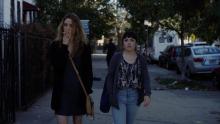
On this week's Cinematalk, the official podcast of the UW Cinematheque, a conversation with writer/director Dan Sallitt.
Sallitt's fifth and latest feature, entitled Fourteen, is his first movie since The Unspeakable Act, which screened at the 2013 Wisconsin Film Festival. In the words of Cinematheque Programmer Mike King, Fourteen "is an absorbing and deeply moving portrait of long-term friendship. Inseparable since middle school, Mara and Jo find themselves drifting down different paths in their twenties—Mara naturally eases into young adulthood, while Jo struggles with commitments and substance abuse. Through seamless temporal ellipses, Sallitt charts their lasting bond over the course of a decade of change."
Mike King's talk with Dan Sallitt focuses on Fourteen and its production, Sallitt's development as an artist, and his evolving appreciation of French auteur Maurice Pialat. The talk concludes by touching on Sallitt's current viewing habits and passionate cinephilia, which you can learn more about on Sallitt's home page.
Plus, learn about how to view Fourteen at home for free, along with three early features of Sallitt's: Polly Perverse Strikes Again! (1986), Honeymoon (1998), and All the Ships at Sea (2004). All of which will be available starting Friday, May 15.
Listen to Cinematalk below!
See DEERSKIN & SPACESHIP EARTH at Home and Support the UW Cinematheque!
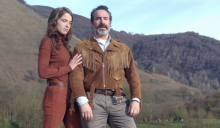
While the UW Cinematheque's free screenings at 4070 Vilas and the Chazen Museum of Art remain on indefinite hiatus during this challenging time, our programming staff will be offering a series of specially curated movies that can be viewed at home.
This week, in partnership with NEON and Greenwich Entertainment, the Cinematheque is providing the opportunity here to view two new releases that were originally scheduled to play the 2020 Wisconsin Film Festival: the fascinating new documentary Spaceship Earth and Jean Dujardin in the absurdist French comedy Deerskin.
A portion of the revenue from each rental will support the Cinematheque and our future programming efforts.
SPACESHIP EARTH: In 1991, eight men and women were sealed into Biosphere 2, an airtight terrarium in the Arizona desert containing miniature versions of various Earth ecosystems: desert, ocean, rainforest, etc. Partly inspired by the movie Silent Running and funded by an oil tycoon hoping to acquire licensable technologies for space colonization, the mission of Biosphere 2 was to maintain an isolated, sustainable environment for two years. It was a mission that led to significant ecological crises under the geodesic domes, including near starvation, polluted air, and a serious problem with cockroaches. Biosphere 2 generated a lot of press, but little was revealed about the people who created it. Using archival footage and new interviews with the surviving participants, Spaceship Earth follows the visionary countercultural collective over half of a century, beginning with early experiments and avant-garde theater performed around the globe leading up to Biosphere 2. If Spaceship Earth is a cautionary tale about the forces that threaten our planet, it is also an inspirational tribute to what a small creative group can achieve. Available for home streaming here. 50% of rental revenues go to support the UW Cinematheque.
DEERSKIN: Oscar winner Jean Dujardin and Portrait of a Lady on Fire's Adèle Haenel delight in this hilarious, shocking comedy, about a man so enamored with his new jacket that he vows to destroy all others. When he first gazes upon himself in a mirror, adorned in a vintage, fringe-covered deerskin jacket, all George can say is, "killer style." Turns out, he means it literally. Seized by the conviction that his should be the only jacket in the whole world, George starts collecting them, right off people's backs, whether they want to give them up or not. He finds a surprisingly loyal coconspirator in Denise, a bartender and aspiring filmmaker who thinks George's increasingly bloody campaign has the makings of a great movie (she's right). The teaming of Dujardin and Haenel is a joy, particularly for such a nutty, one-of-a-kind venture. This unsparing satire of a mid-life crisis has been variously described as "hilarious" by Indiewire, "hilarious" by The Playlist, "laugh-out-loud hilarious" by Film Threat, and "hilarious" by us in the first sentence of this paragraph. Available for home streaming here. 50% of rental revenues go to support the UW Cinematheque.
Check out reviews for Spaceship Earth in The New York Times, The Los Angeles Times, and Variety.
Check out reviews for Deerskin in The New York Times, Rolling Stone, and The Wall Street Journal.
See below to view trailers for Deerskin and Spaceship Earth.
There are several opportunities to watch and participate in online Q&As for Spaceship Earth this weekend. Click here for more information.
And Cinematalk, the official podcast of the UW Cinematheque, is back with discussions about this week's offerings and upcoming Cinematheque programming. Visit our blog here to read more and listen in.
The Cinematheque is also pleased to share online the UW Madison student-produced films in the first Communication Arts Showcase of 2020. Typically a program that helps to conclude our programming seasons, the Communication Arts Showcase films can now be viewed completely for free here.
Go here to donate to the UW Cinematheque.
We value your support for the Cinematheque and we look forward to being able to watch movies with you soon in the proper cinematic settings of 4070 Vilas Hall and the Chazen Museum of Art.
Cinematalk Podcast #5: SPACESHIP EARTH + DEERSKIN

On the first Cinematalk episode since January (and the outbreak of COVID-19), Jim Healy and Ben Reiser discuss what has been happening with UW film culture since earlier this year and what the upcoming programming plans are for the next few months.
Then, a discussion of Matt Wolf's fascinating new documentary Spaceship Earth, which premiered at the 2020 Sundance Film Festival and is now available for home viewing here (beginning 5/8, 12:01 a.m.).
On the final part of the podcast, the Cinematheque's Kelley Conway and Mike King discuss Quentin Dupieux's absurdist comedy Deerskin, starring Jean Dujardin. Deerskin, like Spaceship Earth, was originally a selection of the 2020 Wisconsin Film Festival, and is now available for home viewing here.
Plus: Digressions on Bruno Dumont, Pauly Shore, and also the Spring 2020 Communication Arts Showcase, which can be viewed here for free!
50% of revenues generated from the rentals of Spaceship Earth and Deerskin will directly benefit the UW Cinematheque. Thanks for your support!
Watch THOUSAND PIECES OF GOLD at Home and Support the Cinematheque
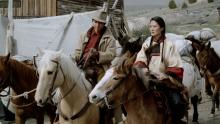
While the Cinematheque's free screenings at 4070 Vilas and the Chazen Museum of Art remain on indefinite hiatus during this challenging time, our programming staff will be offering a series of specially curated movies that can be viewed at home. A portion of the revenue from each rental will support the Cinematheque and our future programming efforts.
This week, in partnership with Kino Lorber, the Cinematheque is providing the opportunity here to view a new restoration of an exciting piece of American independent cinema history, Nancy Kelly's Thousand Pieces of Gold.
THOUSAND PIECES OF GOLD: Set in a mining town in the 1880s, Thousand Pieces of Gold is based on the classic novel by Ruthanne Lum McCunn with a screenplay by award-winning filmmaker Anne Makepeace (Tribal Justice). Upon its original release in 1990, the film won immediate acclaim for its portrayal of the real-life story of Lalu (Rosalind Chao), a young Chinese woman whose desperately poor parents sell her into slavery. She is trafficked to a nefarious saloonkeeper in Idaho's gold country. Eventually Charlie (Academy Award winner Chris Cooper), a man of different ilk, wins her in a poker game and slowly gains her trust. Way ahead of its time, the film resonates even more powerfully today in the era of #MeToo. Nancy Kelly became a victim of prejudice against women directors within the American film industry and was never offered another movie to direct in spite of extraordinary reviews from critics, some of whom compared her talent to that of John Ford.
Click here to read a rave review of Thousand Pieces of Gold from Madison's Rob Thomas of the Cap Times.
Nancy Kelly herself wrote this excellent Indiewire article about how industry sexism halted her career after Thousand Pieces.
Click here or scroll down below to view a trailer for Thousand Pieces of Gold.
Click here, or scroll down below to view an April 29 Q&A with the stars and filmmakers of Thousand Pieces of Gold.
To rent Thousand Pieces of Gold, visit the Kino Marquee site: https://kinonow.com/thousand-pieces-of-gold-uw-cinematheque
To donate to the Cinematheque's Friends of Film fund, visit: https://cinema.wisc.edu/donate
We value your support for the Cinematheque and we look forward to being able to watch movies with you soon in the proper cinematic settings of 4070 Vilas Hall and the Chazen Museum of Art.
Watch SÁTÁNTANGÓ at Home and Support the UW Cinematheque
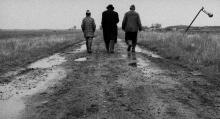
Earlier this year, the UW Cinematheque began our programming for 2020 with a mammoth cinematic event: a screening of Béla Tarr's complete 7 1/2 hour Sátántangó.
Beginning April 24, the Cinematheque, in partnership with Arbelos Films, will be providing an opportunity to view the same 4K restoration of Sátántangó at home! A $14.99 rental for a 72-hour streaming period is now available for pre-order here. 50% of the revenues collected from these rentals will directly support the Cinematheque. The Cinematheque recommends an afternoon/evening viewing session, with two intermissions. Intermissions are built into this streaming home version, at the 2 hours and 17 minutes mark, and at the 4 hours and 21 minutes mark.
One of the greatest achievements in recent art house cinema and a seminal work of “slow cinema,” Sátántangó, based on the book by László Krasznahorkai, follows members of a small, defunct agricultural collective living in a post-apocalyptic landscape after the fall of Communism who, on the heels of a large financial windfall, set out to leave their village. As a few of the villagers secretly conspire to take off with all of the earnings for themselves, a mysterious character, long thought dead, returns to the village, altering the course of everyone’s lives forever.
Shot in stunning black-and-white by Gábor Medvigy and filled with exquisitely composed and lyrical long takes, Sátántangó unfolds in twelve distinct movements, alternating forwards and backwards in time, echoing the structure of a tango dance. Tarr’s vision, aided by longtime partner and collaborator Ágnes Hranitzky, is enthralling and his portrayal of a rural Hungary beset by boozy dance parties, treachery, and near-perpetual rainfall is both transfixing and uncompromising. Sátántangó has been justly lauded by critics and audiences as a masterpiece and inspired none other than Susan Sontag to proclaim that she would be “glad to see it every year for the rest of [her] life”.
Sátántangó is being restored in 4K from the original 35mm camera negative by Arbelos in collaboration with The Hungarian Filmlab.
To pre-order your rental of Sátántangó, visit the Arbelos/Vimeo page here: https://vimeo.com/ondemand/satantangouwcinematheque. During this challenging period, we value your support for the Cinematheque and we look forward to being able to watch movies with you soon in the proper cinematic settings of 4070 Vilas Hall and the Chazen Museum of Art.
Please consider a donation to the Cinematheque's Friends of Film Fund. You'll find more information on donating here.
See BACURAU and Support the Cinematheque!

With regret, the UW Cinematheque announces the cancelation of remaining spring 2020 screenings through May 3. The free screenings have been canceled out of concern for the safety of our community due to the ongoing COVID-19 outbreak. This action is consistent with public health guidance to limit non-essential large gatherings.
During this challenging time, the Cinematheque, partnering with Kino Lorber, is providing the opportunity here to view the superb Brazilian film Bacurau. Originally scheduled to screen at the Cinematheque on March 27 as part of our Premiere Showcase and our ongoing series co-presented by the UW's Latin American, Caribbean, and Iberian Studies (LACIS) program, Bacurau is now available to stream in your homes.
BACURAU: Winner of the Jury Prize at the Cannes Film Festival, this searing political riff on The Most Dangerous Game is the most talked-about Brazilian film of the year. An isolated outback community notices their town has vanished from digital maps, followed by the unnerving presence of a drone overhead. When a wealthy band of armed mercenaries (led by Udo Kier) starts picking them off, the underclass bands together to save what little they have. "A modern-day western with some of the raw, hallucinatory power of a Sergio Leone epic. Rich and extremely filling" (Los Angeles Times).
While we will return to our free screening series as soon as possible, your $12 rental of Bacurau will help support the Cinematheque during this challenging period: 50% of all revenues will go directly to the Cinematheque's Friends of Film fund.
To rent Bacurau, visit the Kino Marquee site: https://kinonow.com/bacurau-uw-cinematheque
To donate to the Cinematheque's Friends of Film fund, visit: https://cinema.wisc.edu/donate
We value your support for the Cinematheque and we look forward to being able to watch movies with you soon in the proper cinematic settings of 4070 Vilas Hall and the Chazen Museum of Art.
Jim Healy, Director of Programming
